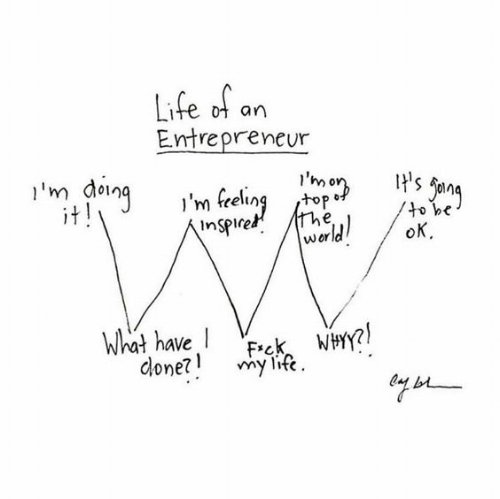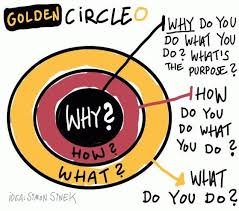Ten Lessons of a Solopreneur
A year ago, I did something crazy. I took a huge leap and "launched" my business, full time.
Sure, I had been coaching for quite some time on the side, but a morning side hustle was quite different from being a full-time entrepreneur and business owner. I knew I loved working with people to unlock their potential, but I was terrified. What would people think? What if I failed? Would my family end up homeless?
The voice of my inner critic was loud, whispering in my ear every time I was ready to jump. The irony wasn’t lost on me. I was working with my clients, telling them to stand up to their own saboteur voices and move in the direction of their dreams. And here I was, scared as shit, and full of self doubt.
So I did what all good coaches do, I took my own advice. I channeled my sage, my inner leader who is compassionate, all knowing, and the only one I know who can put my inner critic in her place. My inner critic, however, is no dummy, and the only way to quiet her is to prove she’s wrong. So, I called on my sage to pull out all of the evidence: the friends and family rooting for me, the hard work and success I’d seen running my side hustle, and my past successes.
It wasn’t easy, but I knew it was a now-or-never moment. So with a husband in the middle of his surgical residency, two kids under the age of three, and very little room for error, I took a leap. Launch Project was a go!
The first few months were a rollercoaster of "This is amazing" to "Holy shit, what have I done?" One day, it was the thrill of entrepreneurship, the next day, the doom and gloom of a failing business venture. There was no steady state.
But things began to even out as I got into a routine. I stopped taking everything so personally and began to see opportunities even in the rejections. I stopped asking everyone else for advice and began following my intuition and knowledge of what was right. I replaced the need to find clients with the drive to be of service to as many people, teams, and organizations as possible. Instead of squirming at the thought of having to speak publicly, I reveled in creating workshops, trainings, and presentations where I got to teach others what I was most passionate about.
Today, I celebrate a year of Launch Project, a year of putting myself out there in a way I never thought I could, and the confidence I’ve gained to know I can take on whatever new challenge, project, or client comes my way.
And while so much of what I’ve accomplished over the past year came from listening to my intuition and having the courage to go after what I really wanted (and the willingness to not care what others thought), there are some sage words of advice I’ve received and lessons I’ve learned along the way. As a coach, I hold the fundamental belief that you are naturally creative, resourceful, and whole, and I also know that there were many times along the way that I wished I could just ask questions and get some input from someone a little further ahead than me.
So, here are my ten of my favorite lessons to share with you. Whether you’re a coach, a prospective entrepreneur, or anyone thinking about launching something of your own, I’m hoping these hard learned lessons will serve you. What I ask in return is that you take (or leave) everything with a grain of salt - this advice worked for me, and it may or may not work for you.
1. Invest in your WHY. I’m a (recovering) do’er and as soon as I got excited about coaching, I was off to the races. I had to print business cards, get a website up, and find clients. I don’t regret that. I do wish that I had also invested some time in figuring out my why. Why was I doing this? What drew me to coaching? Why had it suddenly captured me and become my mission? Many people talk about finding your niche. Niche is still a big question for me. I’ve pendulum’ed on how important it really is, and I’ve gone through a few already. My jury is still out. What I have found to be critical is knowing who I am (and who I am not) and why I’m a coach: I’m someone who loves work and because I love it, it’s not something I keep in a separate box that I tuck away in the evening or weekend. I’m committed to helping others find work that is inspiring and then becoming kick-ass leaders. I’m a leadership coach, not a life coach; I work with people who want to find meaning in their careers and reach their potential. On this topic, Simon Sinek is my hero. He literally wrote the book (now, books) on it. As he says (and then shows you), it doesn’t have to be some year-long vision quest, but it does require some time and some focus. It can seem big and it can be easy to procrastinate. Just sit down and do it (it’s a living document, so we’re not asking for perfection here); everything is easier after.
2. Side hustle. If you can swing it, I highly recommend side hustling before you leap. Once you find your passion, you may be tempted to just quit your job and go full time right away. Don’t. Do. It. Having a business is hard. You want to make sure you really, really want it and can really, really make it work (financially). I side hustled for a year. I kept my full-time job (a leadership role) and coached in the morning and did a lot of the marketing and administrative work at night. I also have two little kids (they were less than 1 and 3 at the time) and my husband is a surgery resident. It was not easy and I was exhausted. But I am so thankful I did it that way. I got to make sure it was what I really wanted to do, I built up a client base so I wasn’t desperate for clients when I launched my business, and it gave me the opportunity to get all of my ducks in a row before I was responsible for all things, all the time.
3. Take care of yourself. You’re embarking on a serious journey of emotional ups and downs. Find your routines and establish how you’ll celebrate your wins. Know how you’ll recover when things don’t go as planned. Some of this was easy for me. I’m a runner, so doing that every morning was natural. But I learned I needed more. I got a coach (more on that in #4), I began receiving Shine texts, and I set real boundaries around my work hours.
4. Get yourself a kick-ass coach. This means shelling out more money when you’re already stretched and nervous about how you can financially swing this whole gig. But solopreneurship is just that: solo. Having a coach who can support you and thought partner with you is invaluable. Believe me, your friends, partner, and family doesn’t want to hear any more about your business. If you’re a coach, get a coach who charges more than you do and who has built a successful business.
5. Be picky about your clients. In the beginning you’re going to think you need to take anyone who comes. Don’t be fooled. This is particularly true for service-oriented business owners like coaches. Coaching is a commitment on both sides, and if someone shows up who you don’t believe in or you don’t have chemistry with, not only will it not work, it will drain you both. Go back to your why and make sure you honor it, even from the beginning. Related, skip mixing business and friends. For coaching, the relationship is too intimate and one-sided. The good news is that both with friends and with people you don’t connect with, you can refer them to your colleagues. And usually, people pay that favor forward. So…
6. Build your referral network. You are not just becoming an entrepreneur, you are joining a community. Stay in touch with others in your industry, and build relationships with your peers and those who have been there and done that. We often make the mistake of thinking those in our industry doing similar work are our competition. If that’s the case, then your market is too small! The more you can build relationships and community with your peers, the happier and more successful you’ll be.
7. And learn from them! Look at what others are doing and learn from it. You don’t have to reinvent the wheel. That said, try to limit too. You want to be able to create your own content and make your business your own. Constantly looking at what others are doing can cause you to wonder if what you’re doing is really yours. The other problem with spending too much time on other’s stuff is that it cause some of those “I’m not enough” saboteurs to show up. I remember looking at a coach’s about us page and thinking: well, I just don’t have anything close to those credentials. Why would anyone hire me? It’s no good. So, here’s a little rule I use: look but don’t linger, check but don’t copy.
8. Soak it in. Try to learn as much as you can. There are so many different things to read, podcasts to listen to, YouTube videos to watch. And you should read/listen/watch as much as you can. But there is such a thing as over saturation. I found myself listening/reading/watching only things that were related to coaching and it became just about checking them off of my list. Find the right balance for you, and ask if you’re really soaking in what you’re learning or if you’re just checking a box. I find taking notes right after reading or listening to something was helpful.
9. Create a board of advisors. If you’re launching a business and becoming a coach - or really any type of solopreneur - it’s a lot, all at once. You need people you can trust and who you can partner with… and even some who are not in your industry. This is critical. You will have your industry network, but you also need a separate group of civilians. This group will serve multiple purposes. First and most important, they will be champions. You need people you can count on to celebrate your wins and pick you up from your losses. Second, and somewhat in contrast to the first purpose, they will be brutally honest with you. These are people that love you enough to let you know when you sound ridiculous or are making a poor decision. Let them into your thought process and plans, and then be fully open to their feedback. You need people who don’t think like you and aren’t cheerleading who will say things like “that’s a whole bunch of jargon that no one else understands” or “I know you’ve explained it several times, but I still don’t really get what you’re doing.” Third, this group will be your advocate. They’ll tell their friends about you, share your content, and make introductions. When you create this group, be up front about what you’re asking for. Make sure they can really commit. And appreciate them. Send them regular updates and do nice things for them too. It’s not all about you. Let them know the good and the bad, and give them a heads up on when you’ll need their input or support.
10. Celebrate! It's so easy to skip over your accomplishments when you have a business to run. But acknowledging what you're doing well and taking the time to share it with others is the fuel you need for the tough times. Use your advisory board, your community, and others in your life to celebrate your wins.









